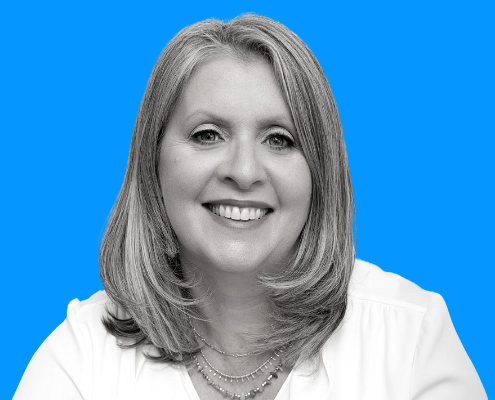Five key takeaways from economic forecast explaining ‘transactional deep freeze’ and cause for optimism.
On January 18, 2023, LightBox sponsored CREW Atlanta’s Economic Forecast with CNBC’s well-known chief economist, Dr. Marci Rossell. After the economic unrest of the past two quarters, there wasn’t a better time to hear from Dr. Rossell who is known for her animated style and unique ability to make complex economic trends relevant. In front of an audience of nearly 500 commercial real estate professionals, she covered a lot of ground: recession fears, the implications of the Ukraine conflict, the interplay of interest rates and inflation, and the historical perspective of today’s economic situation. For our clients who are confounded by the mix of market barometers and the challenges of trying to forecast their business this year, here are five key takeaways from her forecast:
Top 5 key takeaways
- “I do not believe we are in a recession. I believe people confuse inflation with recession.”
A recession is defined as a prolonged period of economic decline across multiple sectors of the economy. What we are seeing right now are reactions from the most interest rate-sensitive sectors, which of course, includes commercial real estate. According to Dr. Rossell, this is an “emotional recession” based on fears about inflation, and those recession fears probably “have legs for another three or four months.”
- “The market may not be as bad as most are imagining.”
The focus today is on inflation, and the Fed’s attempts to control it using rate hikes without triggering a recession. The good news is that inflation peaked last June at a little more than 9%, which means that “it is a matter of time before the Fed gets the message” and backs off its aggressive interest rate hikes. Among LightBox’s clients, perceptions about how bad the market is are understandably mixed. During my CRE market keynote at the Environmental Bankers Association (EBA) 2023 Annual Conference on January 25th, I conducted a live poll of the 420 attendees (the largest environmental due diligence consultants and risk managers at financial institutions) to take their pulse on expectations for this year:
The results reflect a market struggling to make sense of market barometers. While half the audience felt like 2023 could go either way, the remainder was split fairly evenly between bulls and bears, which is not surprising given the economic uncertainty and geopolitical risks impacting CRE today.
- “Workers are never going back to office. Not the way they used to.”
The future of office is on everyone’s mind. Dr. Rossell predicts that employees will go back to the office, but not the way they used to. Instead, employees will likely be using office space an average of three days a week instead of five. Ultimately, companies won’t need as much office space, but they will need higher quality space and more collaborative space. This translates into enormous opportunities to retrofit office space and invest in office redesign, new furniture, new amenities and new technologies.
- “We are in a transactional deep freeze.”
This is a market in transition, and it’s because money isn’t free anymore. We had a slow second half of 2022 that is feeding into a slow first half of 2023. Based on LightBox’s RCM platform, property listings in the second half of 2022 were down 38% compared to the first half (and down 16% below 2H21). Normally, the high levels of property listings of 1H22 would have been followed by robust environmental due diligence and appraisal activity to support deal closings, but last year was far from normal. What would have been a busy 4th quarter for environmental due diligence consultants and appraisers ended up being the slowest quarter of 2022. LightBox’s data shows that environmental site assessments and lender-driven appraisals were down 31% and 43% respectively in 4Q22 vs. 4Q21. According to Dr. Rossell, this “transactional deep freeze” will be short-lived, marking the market’s transition back to more normal levels of investment and lending. Once the market has clarity on the Fed’s policy and future rates, money will move back into play.
- “The role that expectations play in turning points is crucial.”
Interestingly, Dr. Rossell predicted that the transition point won’t necessarily be when interest rates start to come down, but rather, when the market expects them to. From its peak in June, inflation will likely continue to decrease until around March or April. At this point, the Fed will respond with a less hawkish position on interest rates. All we need is for the market “to anticipate that interest rates will be coming down for activity to pick back up. That’s where I expect us to be in two to three months, so go out now, take your vacations and come back in a few months.”
What it all means
At the Fed’s first FOMC meeting this year (on February 1st), Chairman Jerome Powell announced a modest interest rate increase of 25 bps, an early sign that the more aggressive 75 bps hikes of late 2022 are behind us. This could be the year’s first sign of clarity that Dr. Rossell referenced, which could trigger an increase in property listings as investors reinvigorate activity with the perception that interest rates are nearing a peak. The Fed’s next meeting is in late March, and it will be interesting to see if it’s another 25 bps uptick, as expected, or something more aggressive.
There is a misconception, however, that the market’s problems are all related to higher interest rates and that once the rate of increase plateaus, all will be well. While more clarity on future rates is a start, the other piece of the puzzle is price discovery. Right now, buyers are incentivized to wait on property deals because they’re expecting prices to correct so many investors are pushing their investment plans into the second half of 2023. Sellers haven’t been willing to lower prices yet in response to recent developments, so a bid-ask spread developed. A repricing of assets will take time, and with repricing will come opportunistic investment.
The market is fragile, and a lot of factors impacting commercial real estate need to sort themselves out. The news from the next few Fed meetings will be very telling. Until then, it’s important for lenders and investors to stay cautious, do their research and take an extra beat or two to focus on underlying fundamentals and make sure the numbers check out in today’s uncertain market.

